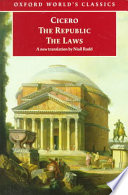
The Republic and The LawsOxford World's Classics - Oxford University PressOxford World's Classics
`However one defines Man, the same definition applies to us all. This is sufficient proof that there is no essential difference within mankind.' (Laws l.29-30) Cicero's The Republic is an impassioned plea for responsible governement written just before the civil war that ended the Roman Republic in a dialogue following Plato. Drawing on Greek political theory, the work embodies the mature reflections of a Roman ex-consul on the nature of political organization, on justice in society, and on the qualities needed in a statesman. Its sequel, The Laws, expounds the influential doctrine of Natural Law, which applies to all mankind, and sets out an ideal code for a reformed Roman Republic, already half in the realm of utopia. This is the first complete English translation of both works for over sixty years and features a lucid Introduction, a Table of Dates, notes on the Roman constitution, and an Index of Names.
Utgiven: 1998
ISBN: 9780192832368
Förlag: OUP Oxford
Språk: Engelska
Sidor: 242 st
`However one defines Man, the same definition applies to us all. This is sufficient proof that there is no essential difference within mankind.' (Laws l.29-30) Cicero's The Republic is an impassioned plea for responsible governement written just before the civil war that ended the Roman Republic in a dialogue following Plato. Drawing on Greek political theory, the work embodies the mature reflections of a Roman ex-consul on the nature of political organization, on justice in society, and on the qualities needed in a statesman. Its sequel, The Laws, expounds the influential doctrine of Natural Law, which applies to all mankind, and sets out an ideal code for a reformed Roman Republic, already half in the realm of utopia. This is the first complete English translation of both works for over sixty years and features a lucid Introduction, a Table of Dates, notes on the Roman constitution, and an Index of Names.
Begagnad bok (0 st)
Varje vecka tillkommer tusentals nya säljare. Bevaka boken så får du meddelande när den finns tillgänglig igen.



